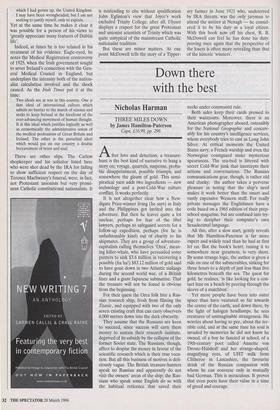Down there with the best
Nicholas Harman
THREE MILES DOWN by James Hamilton-Paterson Cape, £16.99, pp. 296 After love and detection, a treasure- hunt is the best kind of narrative to hang a story on; voyage, quarrels, suspense, proba- ble disappointment, possible triumph, and somewhere the gleam of gold. This semi- piratical yarn adds two ingredients — new technology and a post-Cold-War culture conflict. It works perfectly.
It is not altogether clear how a New- digate Prize-winner living (he says) in Italy and the Philippines got invited into the adventure. But then he leaves quite a lot unclear, perhaps for fear of the libel lawyers, perhaps to safeguard secrets for a follow-up expedition, perhaps (for he is unfashionably kind) out of charity to his shipmates. They are a group of adventure- capitalists calling themselves 'Orca', mean- ing killer-whale, who have persuaded some punters to sink $3.6 million in recovering a possible (ha ha!) $83.12 million of gold said to have gone down in two Atlantic sinkings during the second world war, of a British liner and a giant Japanese submarine. That the treasure will not be found is obvious from the beginning.
For their quest the Orca folk hire a Rus- sian research ship, fresh from filming the Titanic, and equipped with two of the only seven existing craft that can carry observers 6,000 metres down into the dark obscurity.
They assume that the Russians are keen to succeed, since success will earn them money to sustain their research institute, deprived of its subsidy by the collapse of the former Soviet state. The Russians, though, affect to despise the money in favour of the scientific. research which is their true voca- tion. But all this business of motives is deli- ciously vague. The British treasure-hunters speak no Russian and apparently do not visit the owners' areas of the ship; the Rus- sians who speak some English do so with the habitual reticence that saved their necks under communist rule.
Both sides keep their cards pressed to their waistcoats. Moreover, there is an American photographer aboard, ostensibly for the National Geographic and conceiv- ably for his country's intelligence services, whom everybody tries to cast as Long John Silver. At critical moments the United States navy, a French warship and even the Norwegian coastguard make mysterious apearances. The sea-bed is littered with secret Cold-War junk that intercepts their actions and conversations. The Russian communications gear, though, is rather old and clunky; the author takes a perverse pleasure in noting that the ship's nerd makes it work better than the smart and vastly expensive Western stuff. For really private messages the Englishmen have a code based on a 1965 edition of their prep- school magazine, but are confused into try- ing to decipher their computer's own hexadecimal language.
All this, after a slow start, gently reveals that Mr Hamilton-Paterson is far more expert and widely read than he had at first let on. But the book's heart, raising it to somewhere near greatness, is very short. By some strange logic, the author is given a ride on one of the submersibles, sinking for three hours to a depth of just less than five kilometres beneath the sea. The quest for gold, he realises, 'is like looking for a con- tact lens on a beach by peering through the sleeve of a matchbox'.
Yet more people have been into outer space than have ventured so far towards the centre of the earth, and down there, by the light of halogen headlamps, he sees creatures of unimaginable strangeness. He worries about having to pee, about the ter- rible cold, and at the same time his soul is invaded by memories he did not know he owned, of a boy he fancied at school, of a 19th-century poet called Annette von Droste-Hillshoff and her strange-shaped, magnifying eyes, of UHT milk from Clitheroe in Lancashire, the favourite drink of the Russian companion with whom he can converse only in mutually bad German. This is miraculous. It proves that even poets have their value in a time of greed and courage.






















































 Previous page
Previous page